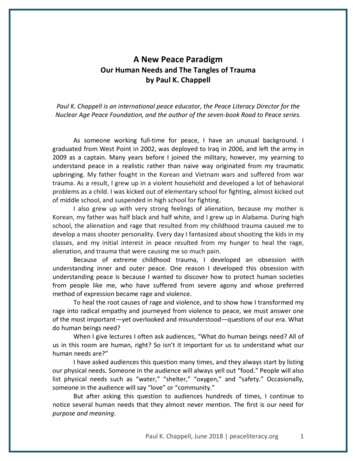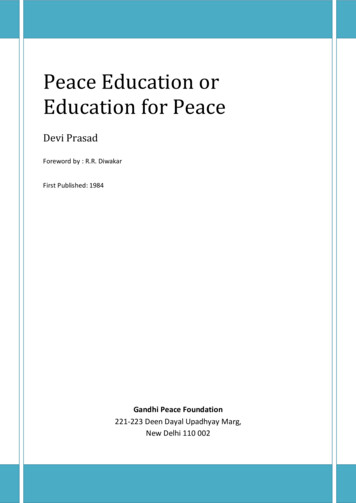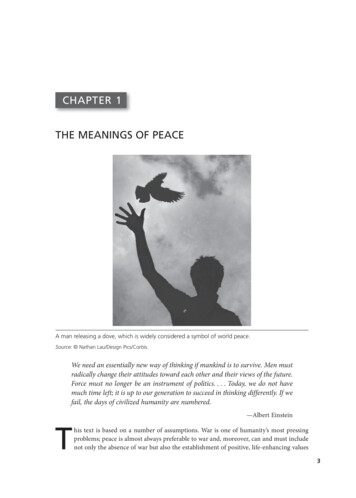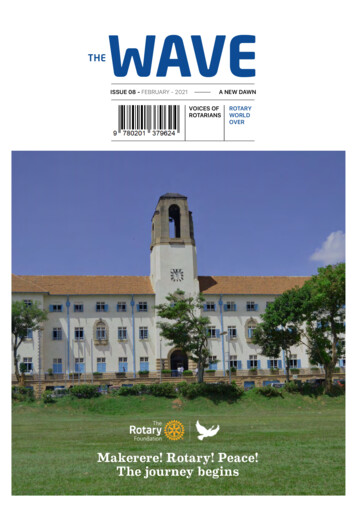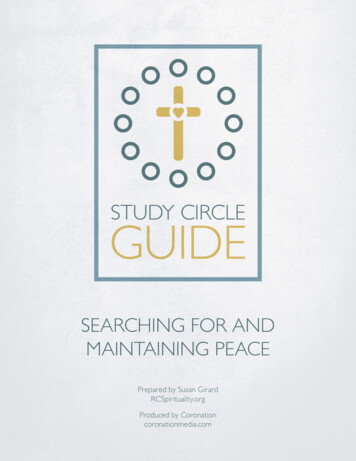
Transcription
SEARCHING FOR ANDMAINTAINING PEACEPrepared by Susan GirardRCSpirituality.orgProduced by Coronationcoronationmedia.com
OVERVIEWSEARCHING FOR AND MAINTAINING PEACESUMMARYThis Study Circle Guide is designed to accompany thesmall book by Fr. Jacques Philippe, Searching for andMaintaining Peace. This book has become a kind ofmodern classic, translating age-old Catholic wisdomabout spiritual growth into language and conceptsapplicable to our contemporary lives.CATEGORIES OF INTERESTPrayer and Spiritual Growth1. Individually, it can be used as a valuable resourcetoward personal growth and fulfillment in thespiritual life. The author offers practical insightstoward achieving and maintaining the peace of soulthat we often seek in the midst of life’s strugglesand day-to-day challenges. These insights, whileproviding a gospel perspective on life, have thepotential to relieve us of our anxieties and worriesas we embrace each new day and the tasks thatGod places before us.2. It can also be used for a group Study Circle in thefollowing format:Read the summary for each session.RECOMMENDED NUMBER OF SESSIONS Choose the study questions that you wouldlike to use and propose one to the group.The section and page numbers providedat the end of each question indicate thearea within the chapter where the answercan be found. Give the group time to readthe section and look for the answer, thenmembers can offer their answer and discussit with the group. Move on to another question when you areready. Members of the groups can choosequestions that interest (or might benefit)them the most. Cover as many questions as you would liketo use or that time will allow.The book is divided into a preface and three shortchapters. The Study Circle Guide follows thatstructure, presenting material for four sessions.MATERIALS NEEDED Each participant should have a copy of this StudyCircle Guide.Ideally, each participant should also have a copy ofthe book, Searching for and Maintaining Peace.WHO CAN PARTICIPATE?Anyone. The book is written in a very simple style anddoes not require advanced knowledge of the Catholicfaith. Because it’s focus is on the day-to-day living of thefaith, the discussions that happen in a Study Circle aboutthis book will tend to be very personal. Participants willhave to share personal comments in order for this StudyCircle to work well in a small group.Little preparation is required with the second method,except on the part of the moderator. Although it isnot always possible for people to prepare in advancefor various reasons, it is more beneficial when thematerial can be read beforehand. (However, whennecessary, key paragraphs in the lesson can be chosenby the moderator and read out loud by a volunteer inthe group.)HOW MUCH HOMEWORK?The amount of homework will depend on the methodchosen for conducting the Study Circle. There are afew different possibilities:RCSPIRITUALITY.ORG : STUDY CIRCLE GUIDESearching for and Maintaining PeaceOverviewPAGE 1
SESSION 1GETTING STARTEDstresses our dependence on God toachieve inner peace, and describes the fruitfulness of apeaceful heart.SUMMARYPART ONE[Read together the preface of the book and/or this summaryintroduction. Then answer the discussion questions at theend of the session.]PART TWOSearching for and Maintaining Peace is a treatise onpeace of heart, which has become a classic work ofmodern Catholic spirituality. It was written by Fr.Jacques Philippe, a well-known spiritual writer andretreat master, and a member of the Community of theBeatitudes in France. In this book, Fr. Jacques offersreaders clear, yet profound guidance with emphasis onpeace of soul as the primary factor in achieving spiritualgrowth and holiness.describes the ways in which we can loseinterior peace, and the means to confront them withconfidence and hope in the power of God’s grace andin the light of the Gospel.is rich in spiritual wisdom from many ofthe saints to encourage and guide us on our lifelongjourney toward achieving and maintaining peace of soulin all circumstances of everyday life.PART THREESUMMARY OF THE INTRODUCTION4. To recognize the fruitfulness of a peaceful heart.We live in a day and age where peace of soul isbecoming more difficult to achieve due to theinfluences around us and the hectic pace of everydaylife. As a result, we find ourselves consumed withworries and anxieties, which complicate our liveseven further and affect our ability to find true peacein God and the joy that comes from serving others.In this book, the author explains how we can achieveand maintain peace of heart by living each day andconfronting each circumstance with confidence and trustin God and in accordance with the values of the gospel.UNDERSTANDING THE BOOKFOREWORD & INTRODUCTIONThis spiritual treasure on peace of heart brings tolight practical examples of the day-to-day struggles weexperience in order to achieve peace of soul, as well asthe means to attain and preserve it. The author invitesus to open our hearts to the power of God’s grace toinstill in us a profound sense of peace, and the desireto put into practice all the good works that God willinspire in us. We will discover how peace of soul canovercome the obstacles in our lives that inhibit ourspiritual progress, and allow us to continue on ourjourney without fear or anxiety, but with complete faithand trust in God.The advice offered by the saints listed in this book isa treasure of spiritual wisdom and encouragement foranyone who wishes to travel along the path to holiness.RCSPIRITUALITY.ORG : STUDY CIRCLE GUIDESearching for and Maintaining PeaceSession 1PAGE 2PURPOSE OF THE BOOK1. To offer readers practical guidance in achieving andmaintaining peace of soul in all circumstances of life.2. To emphasize God’s role and the power of prayerin obtaining and maintaining peace.3. To identify and overcome the dangers that threatenspiritual progress and interior peace.Study and Discussion Questions (Preface)1. Why is this day and age considered one of“agitation and disquietude”?2. What dangers do they pose on our spiritual life?3. The author briefly describes some of the fruits of apeaceful heart. What are they?
QUESTIONS FOR PERSONAL REFLECTION ORGROUP DISCUSSION1. How is my relationship with God at this momentin my life? Is He at the center, or have I put“other things” before Him, things that bringanxiety and unrest to my soul?LIVING THE DOCTRINEHow can I prepare myself to receive the graces thatGod has in store for me through this study circle?What attitude(s) do I need to change right from thestart to allow my heart to be open to His inspirationsand achieve the inner peace that I seek?NOTESRCSPIRITUALITY.ORG : STUDY CIRCLE GUIDESearching for and Maintaining PeaceSession 1PAGE 3
SESSION 2PART ONE: INTERIOR PEACE, THE ROAD TO SAINTLINESSSUMMARYIn order to make progress in the spiritual life, first wemust be convinced that all the good that we do comesfrom God and from Him alone. We are powerless withoutGod’s grace. We often have to experience failures,humiliations and trials in order to realize this truth.The goal we should aim for in the spiritual life is notprimarily to impose a lot of things on ourselves, as goodas they may seem to be by our own judgment. Rather,we must try to discover the disposition of our soul,the profound attitude of our heart and the spiritualconditions that permit God to act in us. It is only in thisway that we can bear fruit—fruit that will last (Jn 15:16).The author explains that by allowing the grace of Godto act in us and to produce in us (with the cooperationof our will, our intelligence, and our capabilities) all thegood works that He has prepared for us, our lives willproduce fruits for the good of those around us. Andthe more our soul is peaceful and tranquil, the moreGod is reflected in it, and the more good works we arecapable of producing for the glory of God and the goodof our neighbor.Oftentimes, we bring agitation and unrest to our soulsby trying to resolve everything on our own, insteadof allowing God’s grace to act in us. We must alwayskeep in mind that His wisdom and power are infinitelysuperior to ours, and He knows what is best for us.Peace begins in our heart; and without our own innerpeace, we are incapable of passing it on to others. Truepeace liberates us from ourselves, allowing us to becompassionate toward the needs of others.To acquire inner peace, one must continuously foster aconversion of heart and attentiveness to prayer.Acquiring and maintaining interior peace should beconsidered a priority for everybody, above all for thosewho claim to want to do good for their neighbor.Otherwise, they would simply be communicating theirown restlessness and distress.An important reality in the spiritual life is to affirm thetruth that the Christian life is a combat, a war withoutRCSPIRITUALITY.ORG : STUDY CIRCLE GUIDESearching for and Maintaining Peacemercy. Every Christian must be convinced that hisspiritual life is the scene of a constant and sometimespainful battle—a struggle against evil, temptation andthe sin that is in him, which will continue throughouthis earthly life. However, it is the combat of one whostruggles with the absolute certitude that the victory isalready won, because the Lord is resurrected. It is exactlythis interior peace which permits him to fight, not withhis own strength, but with the strength of God. This totaladhesion to Christ permits him even in the worst momentsto abandon himself with a blind confidence to the One Whocannot abandon him. (The Lord is my light and my salvation;whom should I fear?) Psalm 27:1The first goal of spiritual combat is not to always obtain avictory (over our temptations, weaknesses, etc.); rather, it isto learn to maintain peace of heart under all circumstances,even in the case of defeat. In this way we can pursuethe greater goal, which is to eliminate our failures,our faults, our imperfections and our sins. This isthe ultimate victory we desire, knowing quite well,however, that it is only by God’s grace that we willachieve it.All the reasons that cause us to lose our sense of peaceare bad reasons that either come from the world, thedevil, or our own imagination and misguided thoughts.The peace we seek is not as the world gives it; it comesfrom trust in the Word of Jesus.In Jesus, we will always abide in peace, because Hehas conquered the world, because He is resurrectedfrom the dead. By His death, He conquered death; Heannihilated the sentence of condemnation that weighs onus. He manifested the benevolence of God toward us.A necessary condition for interior peace is goodwill,or purity of heart. It is a firm disposition to love Godand to do His will in all circumstances, to always say “yes”to God, in the great things as in the small. Goodwill isnot perfection, nor sainthood achieved. But it is theway, because it is just this habitual disposition of heart(whose foundation is found in the virtues of faith, hopeand love), which permits the grace of God to carryus, little by little, toward perfection. However, it alsorequires of us that we become detached from all that iscontrary to the will of God on a continual basis.SESSION 2PAGE 4
STUDY AND DISCUSSION QUESTIONS1. According to St. Therese of Lisieux, what was thebest thing that God could have done in her soul?lies in Him? What obstacles stand in my way? Do Itruly believe that God wants me to be a saint, and thatI can become one with his help?(Section 1, Page 3)2. How can we permit God’s grace to freely operatein our life? (Section 1, Page 5)NOTES3. Why is peace of heart so important to producingfruits in our apostolic endeavors? (Section 2, Page 7)4. According to St. Catherine of Siena, why is spiritualcombat a necessary part of our Christian life?(Section 3, Page 9)5. What is the first goal of spiritual combat?(Section 4, Page 12)6. The author explains that one of the dominantaspects of spiritual combat is the struggle on theplane of thoughts. What does he mean by this?(Section 5, Page 13)7. What is the danger in seeking peace “as the worldsees it?” (Section 5, Page 14)8. Read and reflect on Jesus’ words to St. Gertrudeon the fruitfulness of goodwill. (Section 7, Page 19)Share a personal light or inspiration that you havereceived from this passage.QUESTIONS FOR PERSONAL REFLECTION ORGROUP DISCUSSION1. We cannot achieve true peace without the helpof God’s grace. According to St. Vincent dePaul, “The good that God does is done by GodHimself, almost without our being aware of it. Itis necessary that we be more inactive than active.”What does he mean by this?2. What role does humility play in my openness toreceiving God’s grace?3. How deeply do I realize that I cannot give peace toothers unless I first experience peace?QUESTIONS ON LIVING THE DOCTRINEHow can I abandon myself to God with greaterhumility, confidence and trust, knowing that true peaceRCSPIRITUALITY.ORG : STUDY CIRCLE GUIDESearching for and Maintaining PeaceSESSION 2PAGE 5
SESSION 3PART TWO: HOW TO REACT TO THAT WHICH CAUSES US TO LOSE PEACESUMMARYThe author mentions that the most common reasonfor losing our peace of soul is fear caused by situationswhich affect us personally, involving all aspects of ourlives: our health, family, professional life, moral life andthe spiritual life itself. Our worries and concerns aboutmany things (past, present and future) bring anxiety andrestlessness to our soul.The surest way to losing one’s peace is trying to rely onone’s own resources or those of the world, which arelimited and powerless in facing the many challenges anddifficulties of life.To preserve peace in the midst of the hazards of humanexistence, we have only one solution: We must relyon God alone, with total trust in Him: “Your heavenlyFather knows what you need” (Mt 6:32).Man has lost confidence in God, trying to findhappiness on his own, but becoming unhappy in theprocess. We must regain our lost confidence bybelieving in Divine Providence.The devil, who always attempts to deceive us, tries toinstill in us the belief that total abandonment to Godwill deprive us of everything and destroy our happiness.This distrust in God is the product of original sin,and we must “reeducate” ourselves in the truth, andbelieve with certainty that God will not take away ourhappiness but will leave us in peaceful possession ofmany things when they are not bad in themselves and canserve His designs.The author brings to light two principal obstacles thatprevent us from regaining our confidence in God.1. First, many do not believe in Divine Providencebecause they have never experienced it, andbecause they never give it the opportunity tointervene in their lives. They seek to resolveeverything on their own, without God and withoutsuccess. We cannot experience God’s help unlesswe give Him the necessary space to expressHimself. St. Francis de Sales tells us: “The measureof Divine Providence acting in us is the degree ofconfidence we have in it.”RCSPIRITUALITY.ORG : STUDY CIRCLE GUIDESearching for and Maintaining Peace2. The second great obstacle to abandoning oneselfto Divine Providence is the presence of suffering,in our own lives and in the world around us. Wemust be convinced that God in His power andgoodness will use whatever evil there may be,as well as our own suffering, or the suffering ofa loved one, for our benefit or the benefit ofanother, and that He has the ultimate victoryover evil. It is an act of faith—an invitation tobelieve in the power of Jesus’ Resurrection as thedefinitive victory of God over evil.What really inspires confidence is to contemplate JesusWho gives His life for us, and nourishes us with “toogreat a love” that He expresses on the cross. “Greaterlove than this no man has than to lay down his life for hisfriends.” (Jn 15:13)Evil is a mystery, a scandal, and it will always be so. Itis necessary to do what one can to eliminate it, torelieve suffering, but it always remains present in ourpersonal lives, as well as in the world. Its place in therole of redemption reveals the wisdom of God, whichis not the wisdom of man; it always retains somethingincomprehensible that intervenes.The heart does not awaken to confidence until itawakens to love; we need to feel the gentleness andthe tenderness of the Heart of Jesus. This cannot beobtained except by the habit of meditative prayer, bythis tender repose in God which is contemplative.In the midst of our trials, we can experience “delicaciesof Love” (consolations from God). They are notreserved for the saints. They are for all the poor whobelieve that God is their Father. They can be for uspowerful encouragement to abandon ourselves to Hiscare, far more efficacious than any reasoning.If we learn to abandon ourselves with total confidencein God, in the big things as in the small, with thesimplicity of little children, God will manifest Histenderness, His providence and His fidelity in a mannersometimes overwhelming.It is necessary to abandon ourselves “completely, ornot at all” into the hands of God, with the simplicityof little children, not seeking any longer to manage orSESSION 3PAGE 6
“to save” ourselves by our own initiatives materially,emotionally, or spiritually. We must be disposed to giveeverything to God, without panic, and to allow Him to dothings His way, in total confidence.The measure of our interior peace will be that of ourabandonment, consequently our detachment.If we detach ourselves from everything and put allinto the hands of God, God will return all to usa hundredfold. From personal experience, and toillustrate this point, St. John of the Cross shares withus that “All things were given to me from the momentwhen I no longer sought them.”Abandonment is the fruit of the Holy Spirit, but the Lorddoes not refuse this Spirit to those who ask with faith.One of the most beautiful expressions in the Bible ofconfident abandonment into the hands of God is Psalm23 (Section 8, Page 41).We will be saints the day when our inabilities and ournothingness will no longer be for us a subject of sadness andanxiety, but a subject of peace and joy.Strive for perfection, but never become discouraged!St. Therese of Lisieux teaches us that “small thingsdone with love and to please God are extremelybeneficial in making us grow (one of the secrets ofher holiness). St. Teresa of Avila also reminds us that“Patience obtains everything.”STUDY AND DISCUSSION QUESTIONS1. According to the author, what is the surest wayto lose one’s peace, and the only sure way topreserve it? (Section 1, Page 24)2. How has original sin contributed to man’s loss ofconfidence in God? (Section 1, Page 27)3. Fr. Jacques mentions one important thing that isnecessary to regain confidence in God. What is it?(Section 2, Page 28)4. In order to overcome the fear of suffering in ourlives, what must we be convinced of? (Section 3,Page 31)6. According to the author, why is it necessary toabandon ourselves to God completely or not at all?(Section 5, Page 37)7. Describe some of the devil’s strategies to preventus from abandoning ourselves completely to God.(Section 6, Page 39)8. If we find that we are unable to abandon ourselvestotally to God, what should we do? (Section 7, Page 40)9. Psalm 23 (Page 41) exemplifies total abandonmentto God in confidence and trust. Share a personalreflection or light that you received from readingthis passage.10. Why is our peace of soul tested when weexperience the suffering of a loved one? (Section 9,Page 47) What can we do to alleviate our unrest andbring peace and comfort to the sufferer? (Section 9,Page 48)11. What is the primary motivation to aid us inpeacefully confronting suffering? (Section 10, Page 49)12. Sometimes our suffering is caused by the faultsand shortcomings of others. Give an example ofthis and how it should be addressed in the light ofthe Gospel.13. Why is patience important in our conversion and inthe conversion of others? (Section 12, Page 55)14. After reaching a certain level of progress inour spiritual life, we can sometimes experiencesadness and discouragement when we continuallyexperience a fault or imperfection. The authorgives four reasons why it is important for us tomaintain our peace under these circumstances.What are they? (Sections 13 & 14, Pages 57-64)15. What advice does the author give us aftercommitting sin? (Section 15, Page 65)16. The author makes an important point to considerprior to making a decision. What is it? (Section 16,Page 70)17. Explain in your own words why the only trueperfection is that of love.5. Why does contemplating Jesus on the cross inspiretotal confidence in God? (Section 4, Pages 33 & 34)RCSPIRITUALITY.ORG : STUDY CIRCLE GUIDESearching for and Maintaining PeaceSESSION 3PAGE 7
QUESTIONS FOR PERSONAL REFLECTION ORGROUP DISCUSSION1. Life will always bring with it obstacles to overcome,whether self-inflicted or brought about at thehands of others or the culture in which we live.Whatever the case may be, we must abandonourselves with confidence and trust into the handsof our heavenly Father, in peaceful repose, askingHim for the strength to endure all things withpatience, charity and love. In doing so, we willachieve true peace, holiness, and eternal happinesswith God in heaven. How firmly do I believe this?In what ways has my faith in this Christian truthmanifested itself in my life recently?QUESTIONS ON LIVING THE DOCTRINE1. What areas or circumstances in my life bring methe most anxiety, where I need to abandon myselfmore fully to God? Have I failed to resolve anyconflicts in my life according to the ways of thegospel? As I progress in my spiritual life, what will Ido differently?NOTESRCSPIRITUALITY.ORG : STUDY CIRCLE GUIDESearching for and Maintaining PeaceSESSION 3PAGE 8
SESSION 4PART THREE: WHAT THE SAINTS TELL USthings for the honor and glory of God; let us do thelittle that we can toward that end (with the adviceof our spiritual director); and let us leave it to Godto take care of the rest.SUMMARYThrough the lives of the saints we come to realize morefully and more perfectly that peace, which sows charity,the love of God and love of neighbor in our soul, is theroad that leads straight to eternal life. It is the greatestperfection of love that can be achieved in this life.They taught us by their example that true peace canonly be found in God through complete abandonmentto His holy will, and that genuine humility, which is anecessary condition for peace, brings contentment andpeace to the soul, making it better able to serve God.Following are the personal reflections of each saint ingreater detail: Peace is born of humility. All things contribute to good for those who loveGod. He converts our miseries into grace andheals our souls of our iniquities. One should desire God alone, and the rest inmoderation. The measure of Divine Providence in us dependson the degree of trust that we have in it. Don’t rush to do your tasks, because haste upsetsyour reason and judgment and even prevents youfrom doing well the very thing that you are hurryingto do We must have the patience to see ourshortcomings and to profit from a saintlyassessment of ourselves. Our zeal toward others should be gentle, kind,gracious, peaceful and enduring—never anxious orirritable. Accept, without being troubled, not always beingable to maintain one’s peace.JUAN DE BONILLA Take care never to let your heart be troubled,saddened, agitated or involved in that which cancause it to lose its peace. Rather, work always toremain tranquil because the Lord says: “Happy arethose who are at peace.”Just as a city is not built in a day, do not think that youcan achieve, in a day, this peace, this interior calm,because it is within you that a home must be built forGod, while you yourself, become His temple.True freedom consists in not being attached toanything. It is in this detachment that God seeksyour soul in order to work His great marvels.FRANCIS DE SALES Because love only resides in peace, always becareful to conserve the holy tranquility from God,Who is the Prince of Peace. One must everywhere and in everything livepeacefully (through pain, joy, avoiding evil, doinggood, and in matters of penance). Let us do three things and we will have peace: letus have the very pure intention of will to do allRCSPIRITUALITY.ORG : STUDY CIRCLE GUIDESearching for and Maintaining PeaceST. TERESA OF AVILA DISCERNING BETWEEN GENUINE AND FALSEHUMILITY: Humility does not disquiet, troubleoragitate the soul; it is accompanied by peace, joyand repose. When humility is genuine, the painof its misery fills the soul with sweetness andcontentment; it does not trouble the soul. Rather,it enlarges it and makes it better able to serve God.The other type of pain which the devil proposes tothe soul upsets all things, agitates everything andcompletely disturbs the soul and is full of anger.(Excerpts were taken from the Way of Perfection,Chapter 41. It is highly recommended reading forspiritual growth and peace of soul.)SESSION 4PAGE 9
MARIE OF THE INCARNATION If we could see all the goodness and mercy thatexists in God’s designs for each one of us, even intimes of disgrace, pain and affliction, our happinesswould consist in throwing ourselves into the armsof the Divine Will, like that of a young child whothrows himself into the arms of his mother. Wewould behave, in all things, with the intention ofpleasing God and maintain ourselves in a holyrepose, fully convinced that God is our Fatherand that He desires our salvation more than weourselves desire it.possess the virtues that we don’t have. However,the true means of solidly advancing (in the spirituallife), and with giant steps, is to be patient and tocalm and pacify these anxieties, allowing yourself tobe guided by the Holy Spirit rather than proceedingahead of Him. It is necessary to forget oneself and continuallydirect one’s soul toward God and leave it calmlyand peacefully before Him. The main occupation of your soul should be tomoderate its movements and to acquire a humbleattitude of submission and abandonment into thehands of God. Our role is to be faithful in followingGod’s lead, leaving Him to do in us what seemsbest to Him. Be docile and pliable in the hands of God. Keepyourself at peace and in complete repose, neverbecome upset and never trouble yourself aboutanything, forget the past, live as though the futuredoes not exist, live for Jesus in every moment thatyou are living, without fear or worry, abandon thecare of your soul to Jesus alone. Do not be disturbed if you find yourself weak. Onthe contrary, rejoice, because God will be yourstrength. Only take care to keep your soul everturned towards Him in the greatest possible peaceand in the most perfect abandonment FRANCOIS-MARIE-JACOB LIEBERMANN The best ways to establish in ourselves theadmirable reign of Jesus are precisely those ofcontinual prayer and peace of soul “Keep your soul at peace.” Enclose it in Jesus,in gentle repose, Who holds it in His arms. Thisgentle repose, a peaceful manner of behaving and asteady, measured and quiet interior action expandthe soul. Don’t measure your love of our Lord by the depthof your feelings; abandon yourself into His handswith confidence, and your love will increase moreand more Never allow yourself to become upset by yourmisfortunes. Respond to them, whatever they maybe, with gentleness, peace, tenderness and interiormoderation before God, abandoning yourself simplyinto His hands so that He may make of you and inyou what He pleases. Wish calmly and peacefullyto live only for Him, through Him and in Him. Don’t allow yourself to become discouraged if itappears that you are making no progress. Simplystrive to forget all these things and turn your mindtoward God, standing before Him in the quiet andcontinuous desire that He make of you and in youHis holy pleasure. Do everything with the greatest possible calm andserenity and out of the greatest, purest and holiestlove of Jesus and Mary. One of the principal obstacles on the way toperfection is the impatient desire to progress andRCSPIRITUALITY.ORG : STUDY CIRCLE GUIDESearching for and Maintaining PeacePADRE PIO Peace is the simplicity of spirit, the serenity ofconscience, the tranquility of the soul and the bondof love. Peace is order, it is the harmony in each oneof us, it is a continual joy that is born in witnessinga clear conscience, and it is the holy joy of a heartwherein God reigns. Peace is the way to perfection,or, even better, in peace dwells perfection. The soul should be saddened by only one thing:an offense against God. However, we must beprudent, to regret one’s failures but with a peacefulsorrow and always trusting in Divine Mercy. Onemust beware of certain reproaches and remorseagainst oneself which most of the time come fromour enemy who wants to disturb our peace in God.When in this situation, we must push them asideand find our refuge in confidence in God.SESSION 4PAGE 10
STUDY AND DISCUSSION QUESTIONSA PRAYER FOR HELP IN LIVING THE DOCTRINE1. According to St. Francis de Sales, what three thingsshould we do to obtain peace? (Part 3, Page 88)Dear Lord, you have shown me that it is possible forme to become a saint, with your help and my will anddetermination. I realize that holiness is not just a state ofbeing; it is a way of life that directs all my thoughts andactions in living each day of my life. Holiness isn’t just formy own benefit; it’s also for the good of all those whom youwill place in my path. Through it, I will learn how to serveyou and others with Gospel charity and love.2. St. Teresa of Avila, the great mystic and reformerof the Carmelite order, is considered one of themost profound spiritual teachers in the history ofChristianity. Through her holiness, she attained thehighest level of union possible with God in this life.The Way of Perfection, one of her most cherishedworks, is considered a masterpiece in spiritualwisdom and insight, in
Peace begins in our heart; and without our own inner peace, we are incapable of passing it on to others. True peace liberates us from ourselves, allowing us to be compassionate toward the needs of others. To acquire inner peace, one must continuously
